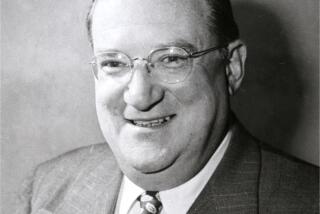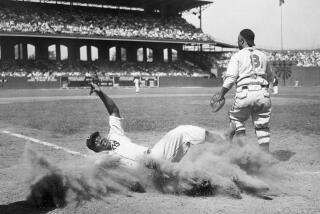Richard Dennis Powell, 92; Baseball Exec Helped Bring Negro Leagues to Baltimore
- Share via
Richard Dennis Powell, who was instrumental in bringing the Elite Giants of the Negro Leagues to Baltimore, and later became the team’s business and general manager, has died. He was 92.
Powell, who was thought to be the last surviving executive of black baseball, from the days when the game was segregated, died Tuesday of cancer at his daughter’s home in Glenwood, Md.
He was responsible for persuading the team’s owner, “Smiling” Tom Wilson, to relocate the team from Nashville, Tenn., to Baltimore in 1938.
“Incredibly over the years, he was the managerial force that kept the team in the league and doing well,” said James H. Bready, author of “Baseball in Baltimore: The First 100 Years.” “He had an instinct for business as well as sports. He also had good people relationships that could hold a team together in those days.”
Pronounced “Eee-light Giants,” the team finished playing in 1950. Integration of baseball put an end to the Negro Leagues by 1953.
“Black baseball is a misnomer,” Powell told the Baltimore Sun in 1990. “It would be the same if you were talking about Greek baseball or Jewish baseball. Men, black and white, have the same physical capabilities to play baseball.
“At no time did we bring the fences in or move them back, or shorten the distance from home plate to first base. When people came to the park, they wanted to see a performance on the field. Baseball was baseball.”
Powell was born in Silver Spring and raised in west Baltimore. His exposure to baseball began in his youth when he followed Baltimore’s Black Sox. The team -- including legendary pitcher Leroy “Satchel” Paige -- flourished after World War I but folded in 1934.
Powell had played sandlot ball but never played professionally. He joined the Elites organization as business manager and later was promoted to vice president. In the early years, he rode the bus with the team as its traveling secretary. He also served as a baseball correspondent for the Afro-American newspapers, turning out his stories on a secondhand typewriter.
“He was always bringing players home like Jim ‘Junior’ Gilliam and Joe Black,” said his daughter, Barbara “Babs” Golden. “Our home ... was like the headquarters for the Elite Giants.”
During World War II, Powell served in the Army Quartermaster Corps, where he attained the rank of sergeant. He then returned to Baltimore and resumed his career as business manager of the team. After the death of Vernon Green, the team’s former business manager who had become the owner, Powell took charge on behalf of the family.
“He was always a gentleman and a man of his word,” Hubert V. Simmons, a pitcher and outfielder for the Elite Giants, told the Sun. “He knew baseball, and he knew the Negro Leagues inside and out. And he was respected by his peers.”
With integration and the demise of the Negro Leagues, Powell hoped for a position with a major league team. The offers never came.
“He really did feel that a job with the majors would come his way,” Simmons said. “It never happened, and I think he was bitter about it. He would have brought a great deal to a major league team.”
But, Golden said, he never lost his affection for the game.
In addition to his daughter, Powell is survived by five granddaughters and four great-grandchildren.
More to Read
Go beyond the scoreboard
Get the latest on L.A.'s teams in the daily Sports Report newsletter.
You may occasionally receive promotional content from the Los Angeles Times.










